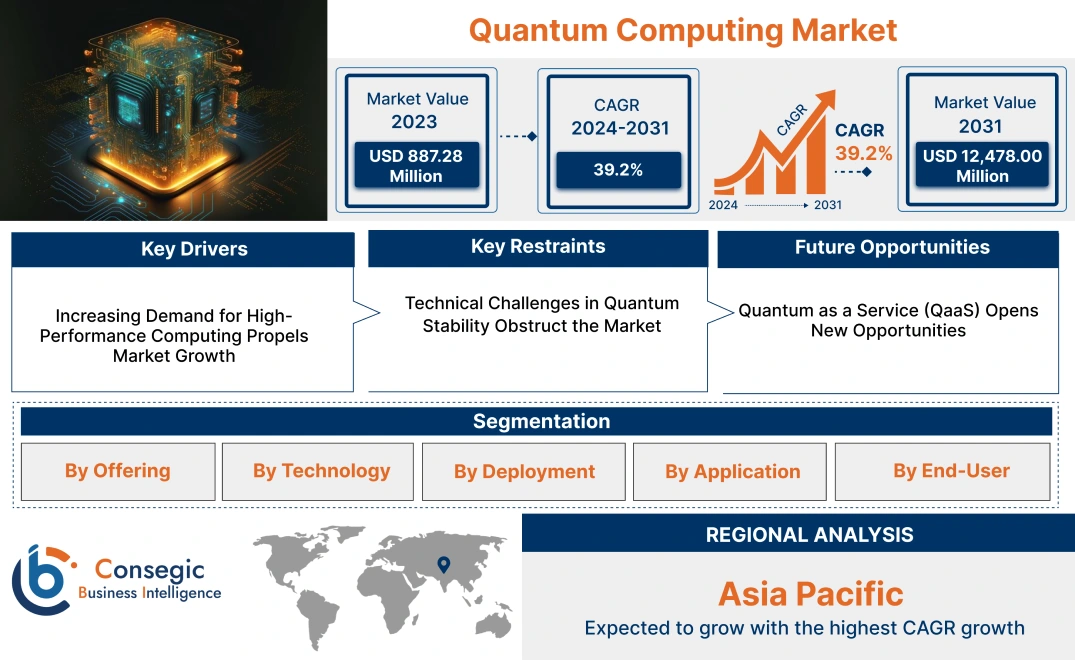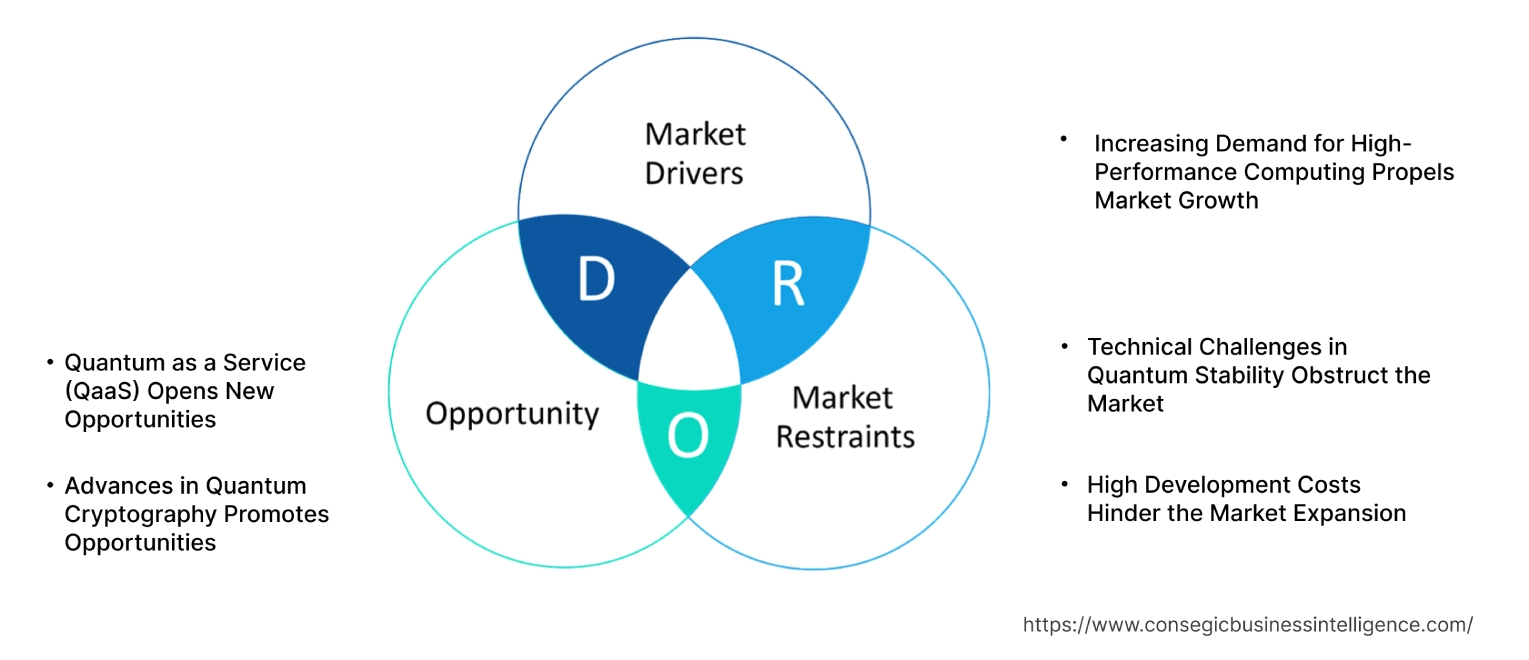- Summary
- Table Of Content
- Methodology
Quantum Computing Market Size:
Quantum Computing Market size is estimated to reach over USD 12,478.00 Million by 2031 from a value of USD 887.28 Million in 2023 and is projected to grow by USD 1,218.91 Million in 2024, growing at a CAGR of 39.2% from 2024 to 2031.
Quantum Computing Market Scope & Overview:
Quantum computing solves complex problems utilizing quantum mechanics with specialized hardware. They can solve these problems at a faster pace, reducing the time taken by classical computers. The advantages include efficient data storage, acceleration of computational speeds, advanced security measures, rapid calculations, and enhanced Google searches. They are mainly used for drug discovery, financial modeling, and material science. The primary end-use industries include healthcare, finance, aerospace, and other technology sectors.
Quantum Computing Market Insights:
Key Drivers:
Increasing Demand for High-Performance Computing Propels Market Growth
Quantum computing meets the demand for high-speed calculations for complex problems, resolving the limitations of traditional systems. To perform tasks such as molecular simulations, optimization of problems, and cryptography, quantum bits (qubits) are utilized to perform parallel computations, allowing faster processing of data. They are majorly adopted in sectors with massive datasets or complex algorithms like finance, healthcare, and logistics.
- In March 2023, NVIDIA DGX Quantum a powerful computing platform was launched by NVIDIA. It is a cluster of Quantum Machines integrated with NVIDIA Grace Hopper Superchip and CUDA Quantum open-source programming model, ensuring the optimization of high-performance computing.
As per the analysis, the quantum computing market growth is driven by the rising demand for high-performance computing in various sectors.
Key Restraints :
Technical Challenges in Quantum Stability Obstruct the Market
Qubit stability is one of the major issues in quantum algorithms, as are their environments. A phenomenon called quantum decoherence occurs, when these qubits face any disturbance, leading to errors. Ensuring accurate calculations in large-scale quantum systems is extremely challenging, as it is difficult to maintain quantum coherence for a long period.
- A 2022 study by Meir Hemmo and colleagues, highlights the challenges regarding quantum decoherence. It cannot explain how a specific outcome is chosen on its own, failing to solve the Many Worlds Interpretation (MWI) of quantum mechanics.
Thus, the difficulty in maintaining qubit stability causes a significant restraint in the quantum computing market demand.
High Development Costs Hinder the Market Expansion
The developmental cost of a quantum computer is extremely high, accounting for the expensive materials, advanced processes, and specialized hardware. Additionally, maintaining qubits at absolute zero for enhanced performance adds to the overall cost. The smaller companies thereby face the financial burden, restricting them from further innovations or research and development. Moreover, the advanced cooling systems and precision engineering, required to ensure a controlled environment, add to the cost.
Thus, the market trends analysis shows that the extremely high operational cost causes a significant barrier to market growth.
Future Opportunities :
Quantum as a Service (QaaS) Opens New Opportunities
Businesses can access Qaas without investing in physical infrastructure through cloud-based platforms. This enables all businesses to research and experiment with quantum operations, with reduced entry barriers.
Additionally, with the reduction in cost due to the integration of quantum as a service, all industries can afford the upfront cost and enhance tasks such as data encryption, simulation, and optimization.
- In December 2023, the Quantum Software as a Service (QaaS) platform called the TQ42 platform was launched by Terra Quantum. This allows both developers and non-technical users to utilize the advanced quantum algorithms and a hybrid quantum cloud infrastructure.
Therefore, the cost-efficiency and reduced dependency on physical infrastructure due to Qaas can potentially surge the market.
Advances in Quantum Cryptography Promotes Opportunities
With the increase in cyber threats, data security has become increasingly important throughout organizations, with current encryption methods having breakable cryptographic codes. By using the principles of quantum mechanics quantum cryptography, which includes Quantum Key Distribution (QKD), enables unbreakable codes for encryption of data. They provide advanced protection against cyber threats, especially in industries with sensitive data such as finance, defense, and healthcare.
- In February 2023, a Quantum Key Distribution (QKD) technology product called LoQomo 1 was launched by QuantLR. This ensures the scalability, security, and cost-effectiveness solution to the OKD adoption.
Therefore, the advanced data security provided by quantum cryptography boosts the quantum computing market opportunities.
Quantum Computing Market Segmental Analysis :
By Offering:
Based on offering, the market is trifurcated into hardware, software, and services.
Trends in the Offering:
- The accuracy of chemistry and finance simulations is increasing because of the continuous innovations in software, ensuring better decision-making.
- Businesses can explore applications virtually without investing in the hardware, due to cloud-based quantum software platforms.
The hardware segment accounted for the largest revenue share of 53.20% in 2023.
- Hardware such as quantum processors use qubits for complex computational processes.
- Different technologies like superconducting qubits and ion-trap, enable error reduction and high qubit performance.
- They are excessively used in industries like materials science and drug discovery, where simple supercomputers can't process complex operations.
- In December 2023, a quantum hardware called the IBM Quantum Heron was introduced by IBM at its Quantum Summit 2023. This significantly reduces error and has a 133-qubit processor with a 3-5× performance boost.
- In conclusion, the complex operation processing capabilities drive the hardware sector in the quantum computing market demand.
Services are anticipated to register the fastest CAGR during the forecast period.
- Due to the fewer hardware investment requirements by the companies, they incline more toward services.
- New services such as quantum-as-a-service (QaaS) platforms are introduced to let users access quantum operations via the cloud. This reduces the cost and makes it very convenient.
- They can solve complex business challenges, enabling the service sector including consulting and training services, to utilize quantum applications and understand their potential.
- In November 2023, the expansion of Quantum Computing as a Service (QCaaS) started after the ecosystem partnership with Equinix. This allows the optimization of Equinix's digital ecosystem across the globe.
- Hence, the growing demand for quantum-as-a-service and consulting services is driving the quantum computing market trends.
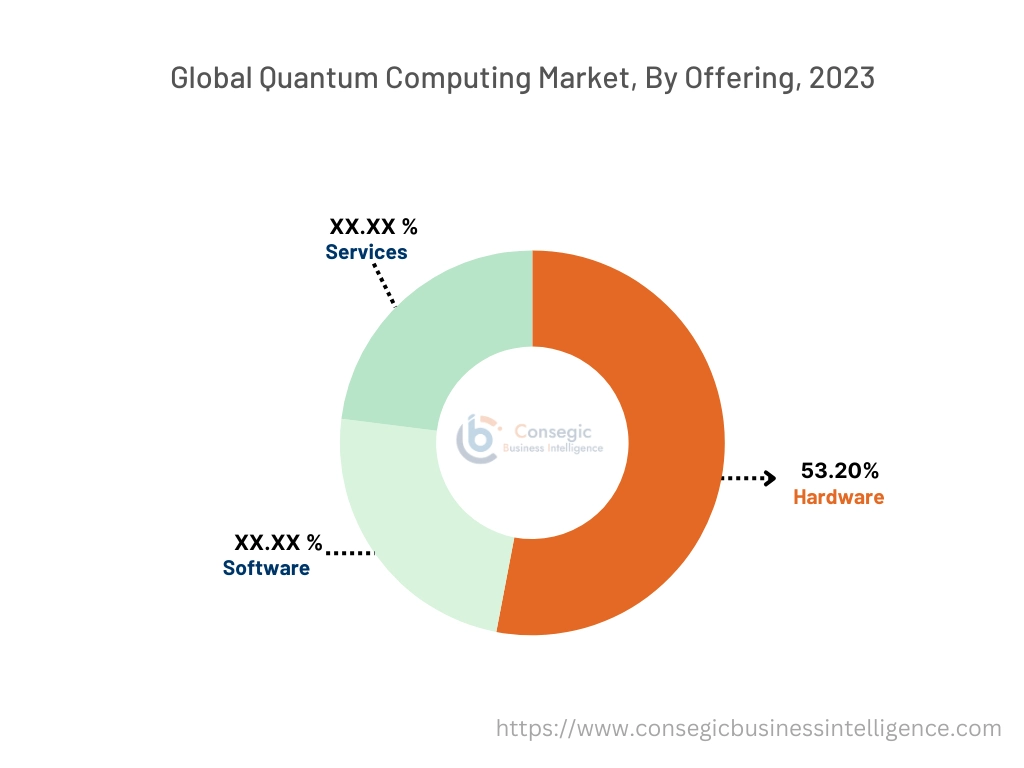
By Technology:
The market is segmented into superconducting qubits, trapped ions, quantum annealing, topological qubits, and photonic qubits.
Trends in the Technology:
- With different companies making advances in quantum technologies, trapped ion quantum computers are gaining more stability and connectivity.
- The optimizations are becoming more feasible with the utilization of quantum annealing and topological qubits.
Superconducting Qubits accounted for the largest revenue share in 2023
- Superconducting qubits are majorly used for large-scale computation, due to the low rates of error and stability.
- They perform high-speed calculations using the superconductors and operate at extremely low temperatures.
- They are used majorly in fields requiring speed and precision, such as cryptography, financial modeling, and drug discovery.
- In October 2023, a hybrid quantum computing platform of 64-qubit superconducting quantum computers was developed by Fujitsu and RIKEN at the RIKEN RQC-Fujitsu Collaboration Center. This is integrated into Fujitsu's 40-qubit quantum simulator, which allows advanced research in chemistry and financial algorithms.
- Therefore, the scalability and fast computational speed, drive the growth of the superconducting qubits sector in the quantum computing market growth.
Photonic Qubits are anticipated to register the fastest CAGR during the forecast period.
- Photonic qubits utilize photons to transfer information. The association with light makes them allows them to provide faster quantum communication and improved computing power.
- They can operate at room temperature, which makes them accessible and can be utilized for real-world operations.
- They enable secure and enhanced data transmission, especially over long distances.
- In March 2022, the world's largest photonic quantum processor was launched by QuiX Quantum. This ensures its place at the core of photonic computers by manipulating light in order to perform computations.
- In conclusion, the faster transmission and the ability to be utilized in real-world applications boost the quantum computing market opportunities.
By Deployment:
The quantum computing market is segmented by deployment into on-premise and cloud-based.
Trends in the Deployment:
- Improved cooling and power management are integrated into on-premise quantum systems, ensuring the stability of qubits over long periods.
The cloud-based sector accounted for the largest revenue share in 2023 and is anticipated to register the fastest CAGR during the forecast period.
- Cloud-based quantum computing reduces the dependence on the on-premise infrastructure, reducing the overall cost for companies and researchers.
- Moreover, smaller organizations are now able to experiment with quantum algorithms, as the major cloud providers are shifting towards providing quantum-computing-as-a-service (QCaaS).
- Additionally, the cloud model supports hybrid computing approaches, combining quantum and classical computing to solve complex problems more efficiently, benefiting industries such as optimization and AI.
- They also solve complex problems being integrated into classical computing, hence increasing flexibility and scalability.
- In June 2022, a publicly available cloud-deployed photonic quantum computer called Borealis was launched by Xanadu. This ensures the utilization of 216 qubits by users, outperforming the classical supercomputers.
- In conclusion, the cost-effectiveness and increased scalability drive the market.
By Application:
The quantum computing market is segmented into optimization, machine learning, simulations, cryptography, and others.
Trends in the Application:
- Accurate simulation of molecular structures and advancements in drug discovery and material sciences are being done using quantum systems.
- Data security and protocols are being improved with the innovations in quantum cryptography.
The optimization segment accounted for the largest revenue of the total quantum computing market share in 2023.
- Sectors such as logistics, finance, and energy use quantum optimization to solve complex problems involving numerous variables.
- Industries where traditional computers fail to operate utilize this technology. These industries include supply chain management and portfolio optimization.
- They solve large-scale combinatorial problems, with enhanced decision-making, with this technology being integrated into classical systems.
- In February 2023, Dirac-3 Entropy Quantum Computer (EQC) a quantum optimization platform was launched by Quantum Computing Inc. (QCi). It modulates variable interactions and encodes problems into its photonic architecture.
- In conclusion, complex problem-solving and better decision-making drive the growth of the optimization sector in the market.
The machine learning segment is anticipated to register the fastest CAGR during the forecast period.
- Quantum machine learning improves the predictive models, by enhancing the speed and accuracy of machine learning algorithms.
- To get accurate risk assessments and personalized medication, this ML technology is integrated into sectors like healthcare and finance.
- The application of quantum algorithms to machine learning models holds the potential to revolutionize fields like fraud detection and drug discovery.
- They can be used to analyze large volumes of data and make advances in the fields like fraud detection and drug discovery.
- In April 2022, a dedicated Quantum Machine Learning (QML) team was formed along with InstaDeep, with the research paper publication of "Autoregressive neural-network wavefunctions for ab initio quantum chemistry," led by Dr. Thomas Barrett. This expands on the drug design and optimization problems, utilizing AI and quantum technologies.
- In conclusion, the advances in technology and better predictions, drive the machine learning sector in the quantum computing market trends.
By End-User:
By end-user, the market is segmented into Aerospace & Defense, Healthcare & Pharmaceuticals, Banking & Finance, IT & Telecom, Energy & Utilities, and Others.
Trends in the End-User:
- To improve data transmission security, quantum cryptography is continuously being developed, by integrating quantum computing with advanced communications networks.
- Quantum systems are continuously used for simulations in the Aerospace & Defense companies, to enhance the dynamics of flights, material engineering, and accuracy of the satellite-based technologies.
The banking & finance sector accounted for the largest revenue of the overall quantum computing market share in 2023.
- Institutions like baking & finance utilize quantum computing to manage large amounts of real-time data, using the computational power to solve very complex financial problems.
- Financial organizations are leveraging quantum algorithms to simulate market dynamics and develop predictive models, leading to more accurate financial forecasting and decision-making.
- To get precise financial forecasting and better decision-making, these organizations utilize quantum algorithms to simulate the dynamics of the market.
- They are also utilized for data security and secure financial transactions, as well as in areas such as real-time fraud detection.
- For instance, HSBC connected its HQ in Canary Wharf, as well as the data center in Berkshire, in order to prevent cyber threats, utilizing Quantum Key Distribution (QKD) and became the first to join the BT and Toshiba's quantum-secured metro network.
- In conclusion, data security and high computing power drive the banking & finance sector in the market.
The healthcare & pharmaceuticals sector is anticipated to register the fastest CAGR during the forecast period.
- Quantum computing enables the simulation of precision molecular, allowing advancements in the areas of drug discovery and development.
- The technology also enhances optimization in clinical trials by processing massive datasets, thereby reducing trial times and costs, especially for complex diseases like cancer and neurodegenerative conditions.
- They can process large datasets, further optimizing the clinical trials and reducing the overall cost and trial time.
- Additionally, this computing enables genome sequencing and analysis on a larger scale, offering the potential for advancements in personalized medicine and targeted therapies.
- They are also used in areas like personalized medicine and targeted therapies, by enabling genome sequencing and large-scale analysis.
- In conclusion, as per the quantum computing market analysis, the processing of larger datasets and optimization of trials drives the healthcare & pharmaceuticals sector in the market.
Regional Analysis:
The regions covered are North America, Europe, Asia Pacific, the Middle East and Africa, and Latin America.
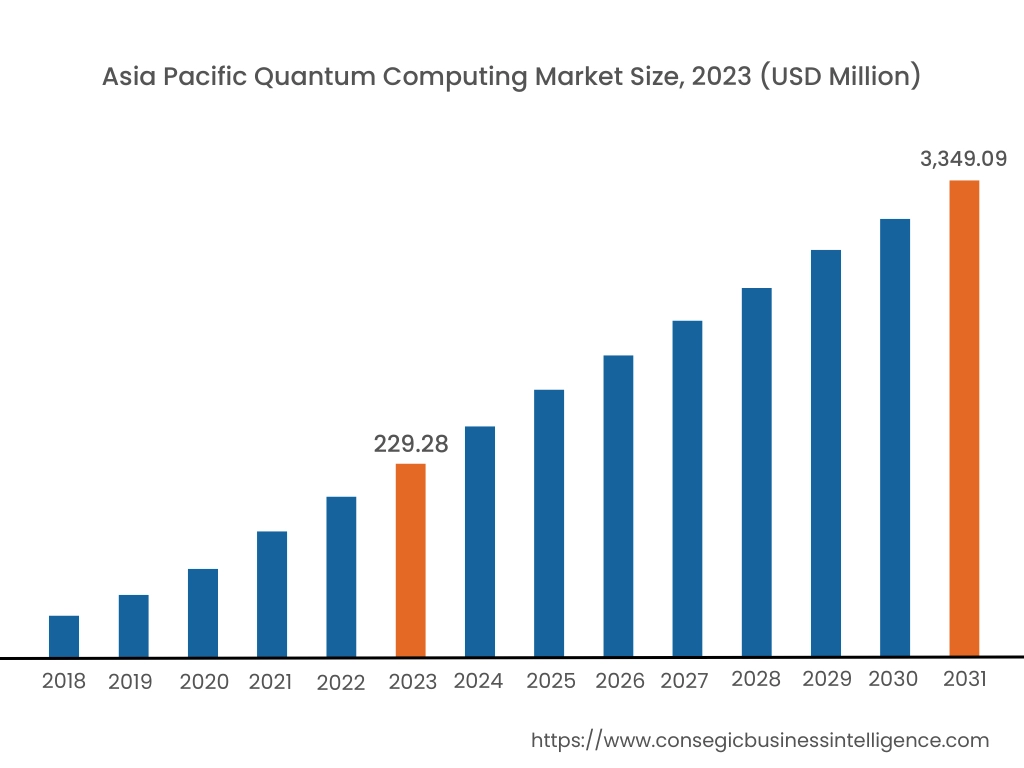
Asia Pacific region was valued at USD 229.28 Million in 2023. Moreover, it is projected to grow by USD 315.99 Million in 2024 and reach over USD 3,349.09 Million by 2031. Out of this, China accounted for the maximum revenue share of 29.4%. The quantum computing market analysis shows that due to rapid urbanization a major shift towards the adoption of new technologies, and the prevalence of medium and small-sized businesses increasingly seeking quantum computation technologies.
- In August 2023, a quantum cloud platform which is the largest in China, was launched by China Mobile, after partnering up with China Electronics Technology Group Corp (CETGC). This enables to utilization of quantum computing with just one single click.
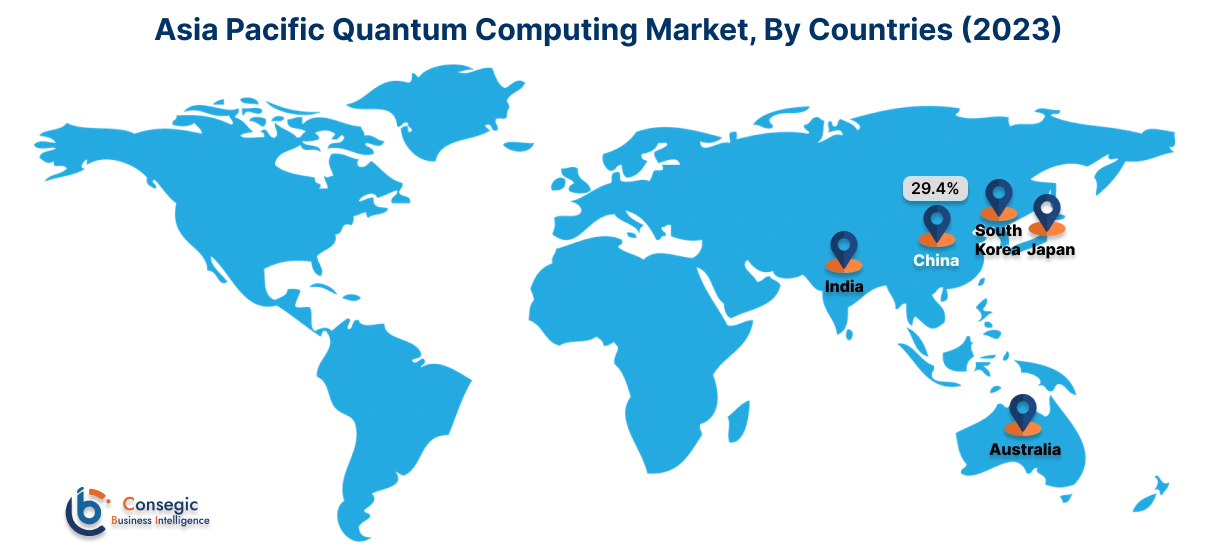
North America is estimated to reach over USD 4,272.47 Million by 2031 from a value of USD 301.36 Million in 2023 and is projected to grow by USD 414.28 Million in 2024.
This is due to the adoption of specialized technologies in an early stage. Companies are increasingly utilizing computing technologies with quantum applications and developing and researching new technologies.
- In April 2022, a commercial quantum-secured metro network was launched by BT and Toshiba, enabling customers across London to connect, ensuring secure transfer of sensitive data.
In Europe, the increasing number of stringent regulations by the government is driving the quantum computing market expansion. The growing investment in computing technologies is the primary driving factor of the market in the Middle East & Africa. The growing research in the computing field is accelerating the growth of the Latin American market.
Top Key Players & Market Share Insights:
The quantum computing market is highly competitive with major players providing products and services to the national and international markets. Key players are adopting several strategies in research and development (R&D), product innovation, and end-user launches to hold a strong position in the global quantum computing market. Key players in the quantum computing industry include -
- IBM Corporation (USA)
- Google LLC (USA)
- Intel Corporation (USA)
- D-Wave Systems Inc. (Canada)
- Rigetti Computing (USA)
- Microsoft Corporation (USA)
- IonQ, Inc. (USA)
- Honeywell International Inc. (USA)
- Toshiba Corporation (Japan)
- Alibaba Group (China)
Recent Industry Developments :
Product Launches:
- In March 2024, a new go-to-market (GTM) strategy was announced by D-Wave Quantum Inc., in order the increase the usage and deployment of quantum computing in the commercial realm.
- In March 2024, a cloud service platform based on the NVIDIA. This allows the exploration of scientific domains, such as chemistry, biology, and material sciences, by the researchers and developers.
Mergers & Acquisitions:
- In June 2024, Mphasis and Classiq enter into a partnership to commercialize the quantum solutions industry. Mphasis on its industry-specific intellectual properties and Classiq's quantum platform can ensure the adoption and integration of these quantum solutions to enterprise operations.
- In January 2024, GXC's Integrated Photonics Division was acquired by ORCA Computing, to provide U.S organizations and government bodies with photonics solutions. This builds upon the 2023 PT-1 quantum photonics systems, to ensure the scalability of quantum computers, and their delivery worldwide.
Partnerships & Collaborations:
- In September 2024, IonQ and Maryland University enter into a partnership, to provide the National Quantum Lab at Maryland (QLab) access to quantum computing. QLAB provides researchers and students to work closely with IonQ's scientists and engineers, to get industry experience.
Quantum Computing Market Report Insights :
| Report Attributes | Report Details |
| Study Timeline | 2018-2031 |
| Market Size in 2031 | USD 12,478.00 Million |
| CAGR (2024-2031) | 39.2% |
| By Offering |
|
| By Technology |
|
| By Deployment |
|
| By Application |
|
| By End-User |
|
| By Region |
|
| Key Players |
|
| North America | U.S. Canada Mexico |
| Europe | U.K. Germany France Spain Italy Russia Benelux Rest of Europe |
| APAC | China South Korea Japan India Australia ASEAN Rest of Asia-Pacific |
| Middle East and Africa | GCC Turkey South Africa Rest of MEA |
| LATAM | Brazil Argentina Chile Rest of LATAM |
| Report Coverage |
|
Key Questions Answered in the Report
How big is the Quantum Computing Market? +
Quantum Computing Market size is estimated to reach over USD 12,478.00 Million by 2031 from a value of USD 887.28 Million in 2023 and is projected to grow by USD 1,218.91 Million in 2024, growing at a CAGR of 39.2% from 2024 to 2031.
What specific segmentation details are covered in the quantum computing market report? +
The quantum computing market report includes specific segmentation details for offering, technology, application, end-user, deployment, and region.
Which is the fastest segment anticipated to impact the market growth? +
In the deployment segment, the cloud-based sector is the fastest-growing segment during the forecast period due to the reduced dependency on physical infrastructure.
Who are the major players in the quantum computing market? +
The key participants in the quantum computing market are IBM Corporation (USA), Google LLC (USA), Microsoft Corporation (USA), Intel Corporation (USA), D-Wave Systems Inc. (Canada), Rigetti Computing (USA), IonQ, Inc. (USA), Honeywell International Inc. (USA), Toshiba Corporation (Japan), Alibaba Group (China)
